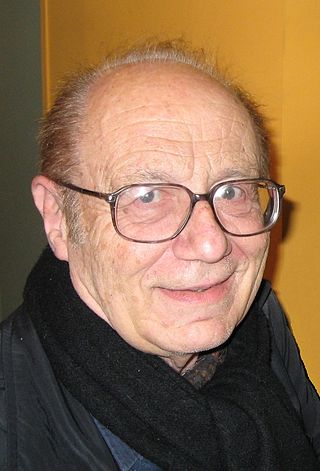
The Prix Théophraste-Renaudot or Prix Renaudot is a French literary award.
Viviane Forrester was an essayist, novelist, journalist and literary critic.

Pierre-Jean Rémy is the pen-name of Jean-Pierre Angremy who was a French diplomat, novelist, and essayist. He was elected to the Académie française on 16 June 1988, and won the 1986 Grand Prix du roman de l'Académie française for his novel Une ville immortelle.
Patrick Besson is a French writer and journalist.
The Prix du Premier Roman is a French literary prize awarded to an unpublished novelist between the ages of 18 and 30. The monetary reward is 3,000 Euros.
The Prix Guizot is an annual prize of the Académie Française, which has been awarded in the field of history since 1994 by Fondations Guizot, Chodron de Courcel, Yvan Loiseau and Eugène Piccard.
The Prix Méditerranée is a French literary award. It was created in 1984 in Perpignan by the Mediterranean Centre of Literature (CML) to promote cultural interaction among the numerous countries surrounding the Mediterranean Sea. Two awards are handed out every year, the Prix Méditerranée itself and the Prix Méditerranée Étranger. The latter is given to a writer from the Mediterranean basin whose original work has been translated into French.
The Roger Nimier Prize is a French literature award. It is supposed to go to "a young author whose spirit is in line with the literary works of Roger Nimier". Nimier (1925–1962) was a novelist and a leading member of the Hussards movement. The prize was established in 1963 at the initiative of André Parinaud and Denis Huisman and is handed out annually during the second half of May. It comes with a sum of 5000 euro.
The Prix Maison de la Presse is an annual French literary prize, established in 1970 by the Syndicat national des dépositaires de presse (SNDP) and Gabriel Cantin. Until 2005 it was known as Prix des Maisons de la Presse and given out in the two categories Novel (Roman) and Non-Fiction (Document), after which the name was changed and the categories merged into one.

Rama Ayalon is an Israeli translator of French literature into Hebrew. She has translated over 100 books, encompassing classic and contemporary prose, philosophy, and psychoanalysis. Her translations include important philosophical works such as Pensées by Blaise Pascal and Totalité et infini by Emmanuel Lévinas. Among the prose authors she has translated are Michel Houellebecq, Georges Simenon, Marguerite Duras, Guy de Maupassant, Romain Gary, Milan Kundera, Delphine de Vigan, and Leïla Slimani.

Laure Adler is a French journalist, writer, publisher and radio/TV producer.
The prix Contrepoint is a French literary award established in 1971 by a group of young French novelists and journalists. Each year a French-speaking novelist is selected.
Éric Ollivier, pseudonym for Yves Duparc, was a French writer, screenwriter and journalist, laureate of several French literary awards.

Nicolas d’Estienne d’Orves is a French journalist and writer.
The Prix France Télévisions are annual literary awards in France. Since 1995, the national television broadcaster France Télévisions has awarded two prizes, for a novel and an essay. The judging panel consists of 15 television viewers chosen from across France, on the basis of their cover letters.

Pierre Bourgeade was a French man of letters, playwright, poet, writer, director, journalist, literary critic and photographer. A descendant of Jean Racine, he was also the brother-in-law of the writer Paule Constant.
Alexandre Blokh, called Jean Blot, was a French writer, translator, and senior civil servant of Russian origin.
The grand prix de la Critique littéraire was created in 1948 by Robert André. It is awarded each year by the French PEN club to a literary essay. Chaired by Joël Schmidt, its jury is now made up of Jean Blot, Jean-Luc Despax, Jean-Claude Lamy, Daniel Leuwers, Jean Orizet, Laurence Paton, Antoine Spire and Patrick Tudoret. Since its creation, it has rewarded many leading authors and intends to promote a literary criticism of quality and, quite simply, literature.
Patricia Reznikov is a Franco-American writer.
Pierre Moustiers is the pen name of French writer Pierre Rossi.







